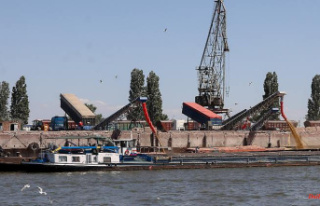Germany should be free of nuclear power by 2023, at least that's the plan. However, the debates about continued operation are currently in full swing. Chancellor Scholz is initially waiting for the results of a stress test. But extended operation does not seem to be that easy.
No quick decisions can be expected regarding the possible continued operation of the three remaining nuclear power plants in Germany beyond the end of the year. Chancellor Olaf Scholz initially wants to wait for the results of a second stress test on the security of the electricity supply, said a government spokeswoman.
She confirmed that the question of continued operation of the three nuclear power plants beyond the end of the year would be examined with an open mind. A spokesman for Federal Environment Minister Steffi Lemke said: "At the moment we are assuming that Germany will phase out nuclear power." The requirements for continued operation would be very high, security issues would be decisive.
A week ago, the Federal Ministry of Economics announced a second stress test on the security of the electricity supply in Germany. The point is to determine whether the security of supply in the electricity sector and the safe operation of the grid are guaranteed under more stringent assumptions. A spokeswoman confirmed that results can be expected "in the next few weeks".
She again pointed out that Germany primarily had a gas problem and not an electricity problem because of the throttling of Russian deliveries. Nor is it about allowing German nuclear power plants to run longer in order to replace "broken" French nuclear power plants. A first stress test from March to May of this year came to the conclusion that security of supply is guaranteed for the coming winter.
Bundestag Vice President Katrin Göring-Eckardt does not rule out the so-called extended operation of nuclear power plants in Germany beyond the end of the year. When asked whether the Greens would allow a stretching operation, she said on the ARD program "Anne Will": "If it happens that we have a real emergency situation, that hospitals can no longer work when such an emergency situation arises, then we need to talk about what about the fuel rods."
According to current law, the three remaining nuclear power plants Neckarwestheim 2, Emsland and Isar 2 must be shut down by December 31 at the latest. In the current year, they have a share of around six percent in net electricity generation in Germany. A stretching operation is not considered easy.
The Federal Ministries for the Environment and Economics came to the conclusion in an examination in March that the three reactors with the existing fuel rods could only continue to run after December 31 if their power generation was throttled beforehand. The ministries had advised against continued operation.
According to the Society for Plant and Reactor Safety, a stretching operation for at least 80 days would be feasible. The FDP is for longer terms. The Vice Chairman of the SPD parliamentary group, Matthias Miersch, is still skeptical about continued operation. He told the newspapers of the Funke media group that the safety checks on the remaining nuclear reactors were 13 years old, and that too had to be taken into account.
According to the Ministry of the Environment, the periodic safety checks serve to put a nuclear power plant through its paces in addition to ongoing checks. According to the Atomic Energy Act, the PSRs actually have to be carried out every ten years. The last time there was a PSR for the remaining three nuclear power plants was in 2009.
The last PSR could have been waived - if the nuclear power plant operator had declared in a binding manner that power operation would finally cease no later than three years after the date prescribed for the last PSR. Christoph Bautz, executive director of the campaign network Campact, said: "Nuclear power plants are a ticking time bomb whose detonator is looser with each year of operation." With an extension of the lifetime for burning the fuel rods, there is a risk of turning away from the nuclear phase-out in principle.












